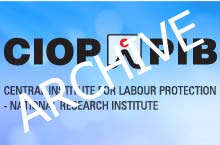
 |
About us |
 |
Research area |
 |
News |
 |
Our Offer |
 |
OSH abroad |
 |
Certification |
 |
Library |
International dimension of safety
An extraordinarily dynamic development in the Institute’s international cooperation has taken place within the last decade, especially following Poland’s accession to the EU, and this cooperation now constitutes a very important part of the Institute’s activity. It mainly appears in the form of international projects; bilateral cooperation with foreign centres, scientific networks and international organisations; participation in the works of advisory bodies to the European Commission; and the participation of Institute employees in foreign scientific conferences, as well as the organisation of such conferences and other meetings at the Institute. The Institute has also participated in projects within European Union Framework Programmes. The first of those projects were realized under the EU 5th Framework Programme (1998-2002), and the participation gradually increased in successive EU Framework Programmes. The most important international projects conducted with significant Institute participation within EU Framework Programmes include:
Since 2004, the Institute has also been conducting Topic Centre projects funded with EU resources by the European Agency for Safety and Health at Work headquartered in Bilbao, the subjects of which include examples and analysis of best practice, and analysis of occupational safety and health research and other data originating from Member States. Three such projects, coordinated by the Institute, have been conducted by countries applying for EU membership. Between 2005 and 2008, the Institute participated in further projects – the Topic Centre Risk Observatory and the Topic Centre Working Environment, and, since 2009, in the Topic Centre Occupational Safety and Health project. Moreover, the Institute participates in international projects funded with EU resources (e.g. PROGRESS, Leonardo da Vinci, COST or service contracts) or by other sources, such as non-refundable foreign aid programmes. As part of the PROGRESS EU programme planned for 2007-2013 on employment and social solidarity, established to financially support the implementation of European Union objectives in employment, social affairs and equal opportunities, as set out in the Social Agenda, the Institute participates in several projects on ‘Working conditions’. The Institute also cooperates internationally within network structures. At present, they include:
For many years now, the Institute has been cooperating with the most prominent international organisations operating in occupational safety and health – the International Labour Organisation and its component unit – the International Occupational Safety and Health Information Centre (CIS) – as a national CIS centre, as well as with the European Agency for Safety and Health at Work, as the Agency’s Focal Point nominated by the Ministry of Labour and Social Affairs. The Institute employees have frequently been delegated by the Polish Government / Ministry of Labour and Social Policy to represent Poland on such European Commission bodies as:
The participation of Institute employees in the most prominent international scientific conferences and seminars, and their presentations of the results of research conducted at the Institute in the form of lectures and posters, have made it possible to create and popularise the image of the Institute as a competent scientific entity in occupational health and safety and ergonomics which is recognised on the international forum. In practice, this has resulted, among other things, in the Institute’s scientific employees being invited to participate in numerous international projects.
|
 |